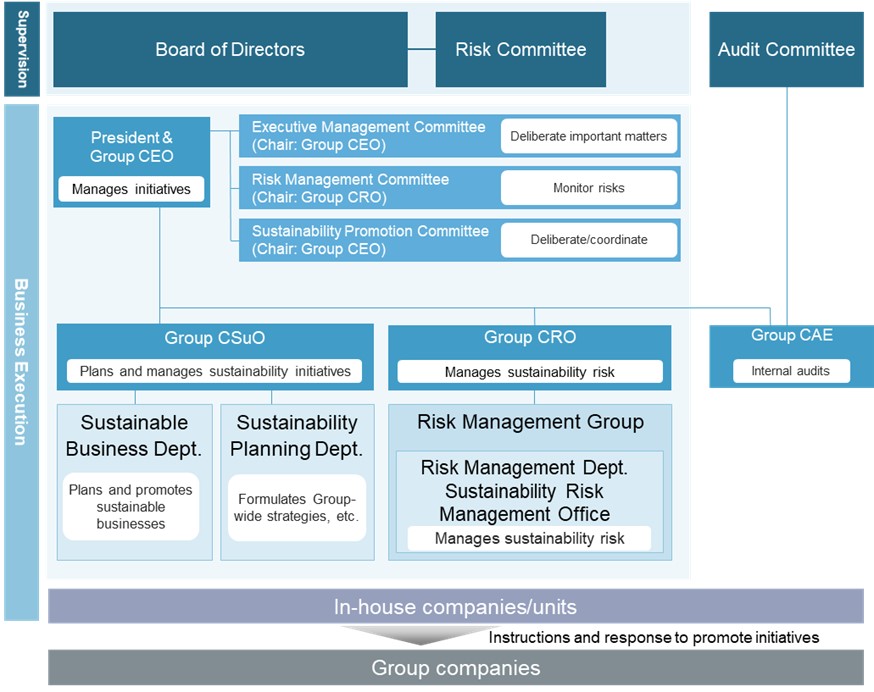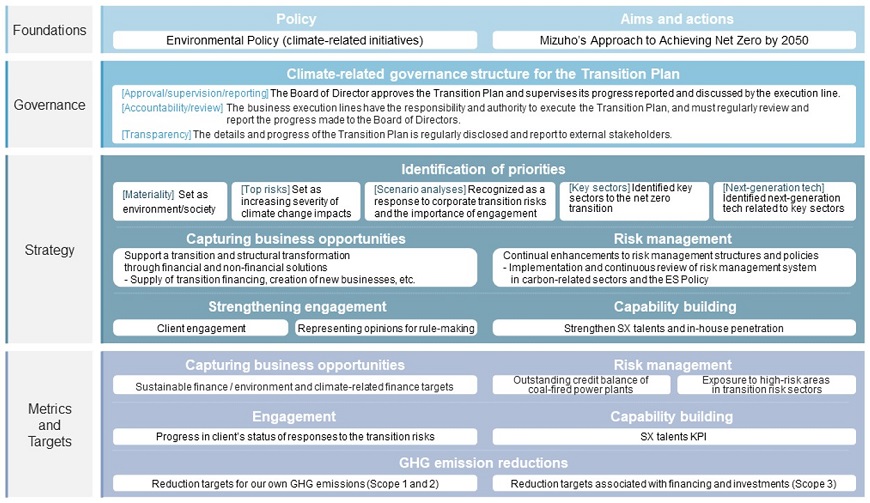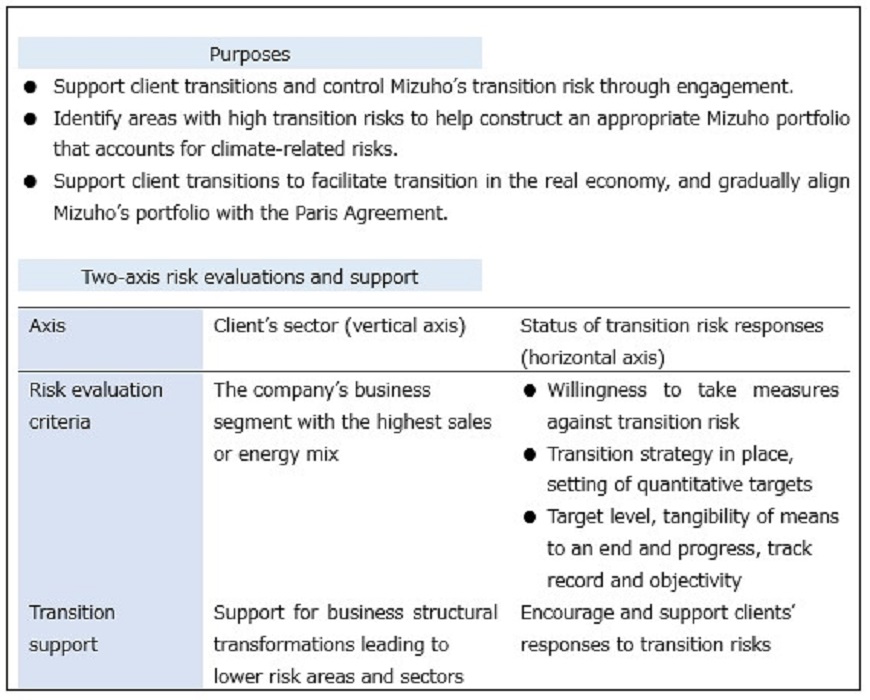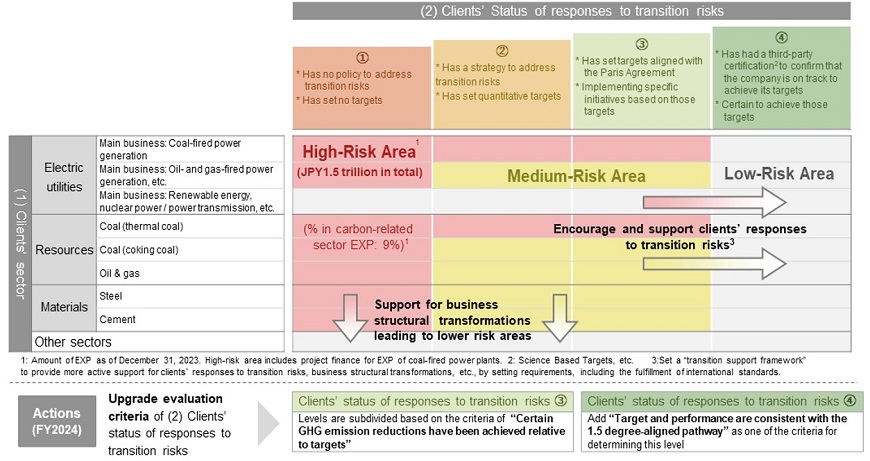This document has been translated from the Japanese original for reference purposes only. In the event of any discrepancy between this translated document and the Japanese original, the original shall prevail. Mizuho Financial Group, Inc. assumes no responsibility for this translation or for direct, indirect or any other forms of damages arising from the translation.
May 15, 2024
Company: Mizuho Financial Group, Inc.
Representative: Masahiro Kihara, President & Group CEO
Head Office: 1-5-5 Otemachi, Chiyoda-ku, Tokyo
Stock code: 8411 (Tokyo Stock Exchange Prime Market)
Opinion of Mizuho's Board of Directors on Shareholder Proposals
Regarding the agenda of the 22nd Ordinary General Meeting of Shareholders scheduled to be held on June 26, 2024, Mizuho Financial Group, Inc. (President & CEO: Masahiro Kihara) has received a document stating shareholders' intentions to exercise their proposal rights. Mizuho hereby announces that at its Board of Directors meeting held today, it has resolved to oppose the shareholder proposals.
1. Proposing Shareholders
Joint proposals by three shareholders
*As some of the proposing shareholders are individuals, the names are withheld.
2. The Shareholder Proposals
Please refer to the Appendix.
3. Opinion of the Board of Directors on the Shareholder Proposals and the Reasons therefor
(1) Proposal 1 Partial amendment to the Articles of Incorporation (Director competencies for the effective management of climate-related business risks and opportunities)
The Board of Directors opposes this proposal.
We selected experience in and knowledge of environmental and other sustainability-related operations, including climate change-related operations, as one of the areas in which the Board of Directors as a whole should possess specific skills. In addition, regarding the nominations of the directors and the evaluations of the effectiveness of the Board of Directors, we set out policies and other frameworks in the Corporate Governance Guidelines and also regularly disclose the results of the evaluations on the effectiveness of the Board of Directors. Furthermore, by utilizing the expertise possessed by external experts, we established a system that enables us to perform appropriate supervisory functions. Specifically, major management issues, including climate change risk management, are discussed at the Board of Directors meetings and the Risk Committee meetings and the contents thereof are regularly disclosed.
With that said, it is important to ensure the balance, diversity and other related matters of the Board of Directors as a whole in order to perform supervisory functions.
Accordingly, the Board of Directors is of the opinion that it would be inappropriate to insert, as called for by this proposal, stipulations pertaining to specific areas such as climate change in the Articles of Incorporation, which should contain stipulations on corporate organization and other basic items.
Details of our group's opposition regarding the shareholder proposal are as described below.
1. Sustainability Promotion Structure
We set forth our vision for the future, centering on personal well-being and the achievement of a sustainable society and economy to support it. In particular, we are addressing climate change as one of the most important issues in regard to our business strategies, and are promoting activities to address climate change. We also established a system where climate-related initiatives are discussed at the business execution line, which includes the Sustainability Promotion Committee, Risk Management Committee and Executive Management Committee, and reports based on discussions at the business execution line are made to the Board of Directors and supervision is performed with respect to such initiatives by the Board of Directors and the Risk Committee in accordance with the structure for promoting and managing each initiative.
In addition, external experts are invited to the Risk Committee and Sustainability Promotion Committee to provide recommendations to and exchange opinions with directors and executive officers as defined in the Companies Act based on their expertise in sustainability, including climate change.

2. Status of Supervision
We continue to enhance our approaches to climate change based on active discussions with outside directors and committee members at meetings of the Board of Directors and Risk Committee. For the composition of the Board of Directors and approach to considering candidates for members of the Board of Directors, please see page 84 of the Integrated Report (Annual Review) "Composition and skills of the Board of Directors".
<Discussions at meetings of the Board of Directors and Risk Committee>
- It is necessary to be committed, through suggestions to clients and policy recommendations, to more effective engagement and to risk controls in carbon-related sectors as a result of such activities.
- It is also necessary to identify risks related to technologies and next-generation technologies for transitions.
- Transition risks have been highlighted over the past few years; however, we should also pay attention anew to physical risks in light of the extreme weather conditions in recent years. Further, it is necessary to confirm the macroeconomic impacts resulting from such risks.
- It should also be noted that events that do not form part of the basis for calculation of the amount of the impact under the scenario analyses may occur. Such potential impact includes the impact of reputational damage to credit clients which could be triggered by ESG factors.
- Regarding credit policies for cases where our engagement is not effective and the initiatives toward decarbonization are not progressing, it is necessary to thoroughly discuss these from the perspective of risk management control.
- Our sustainability initiatives are steadily progressing. Going forward, it will be essential whether or not our efforts are actually having an impact on society towards decarbonization and structural transformation in industry for decarbonization.
This proposal requires inserting into the Articles of Incorporation stipulations pertaining to specific and individual matters, such as the formulation of policies and processes for nominating directors, and the evaluation of the Board's effectiveness in relation to a specific area, i.e., climate change. We will continue to enhance our approaches, taking into account rapidly changing circumstances and the discussions at business execution and supervisory lines, in response to climate change and various environmental and social issues. In this context, it is important to ensure the balance, diversity and other related matters of the Board of Directors as a whole in order to perform effective supervisory functions. Accordingly, the Board of Directors is of the opinion that it would be inappropriate to insert, as called for by this proposal, stipulations pertaining to specific areas such as climate change in the Articles of Incorporation, which should contain stipulations on corporate organization and other basic items.
(2) Proposal 2 Partial amendment to the Articles of Incorporation (Assessment of customers' climate change transition plans)
The Board of Directors opposes this proposal.
In light of the importance of climate-related risk management, we have established the risk control framework for carbon-related sectors and disclose the criteria for evaluation of, and the developments in, clients' status of responses to transition risks. We engage with our clients based on the understanding that our role as a financial institution is fulfilled by supporting our clients through financing and other measures in order to promote the transition of the real economy. On that basis, we carefully consider whether to continue business with a client in the event that the client has not formulated a transition strategy even after a certain period of time after the first engagement.
In addition, we are continuously enhancing this framework in order to pursue efforts to limit the temperature increase within 1.5°C, such as by planning on adding "Target and performance are consistent with the 1.5 degree-aligned pathway" to the criteria for evaluation of clients' status of responses to transition risks.
With that said, in respect of the Articles of Incorporation, which should contain stipulations on corporate organization and other basic items, inserting stipulations pertaining to individual business execution therein may hinder our ability to respond flexibly and promptly. Accordingly, the Board of Directors is of the opinion that it would be inappropriate to add what this proposal requires to the Articles of Incorporation.
Details of our group's opposition regarding the shareholder proposal are as described below.
1. Initiatives to Address Climate Change
We have developed "Mizuho's Approach to Achieving Net Zero by 2050," which outlines our aims and actions to achieve a decarbonized society by 2050 by pursuing efforts to limit the temperature increase within 1.5°C, and "Net Zero Transition Plan," which clarifies medium to long term strategies and initiatives. We are promoting our climate change responses in an integrated manner, from the perspectives of facilitating transitions in the real economy, capturing business opportunities and enhancing risk management.
<The Net Zero Transition Plan – Overview –>

2. Climate-Related Risk Management
(1) Overview of the risk control framework for carbon-related sectors
We control risks through engagement for the purposes described below in sectors found in qualitative evaluations to have high transition risks (carbon-related sectors), and disclose the details of such measures to the public. We evaluate the degree of risk for each client along two axes: the client's sector and the status of the client's responses to transition risks. From these evaluations, we provide appropriate support for the client's transition.
We will continue to make gradual improvements to our risk control frameworks for carbon-related sectors through quantitative identification of climate-related risks and revisions to evaluations of client responses to transition risks in light of the external business landscape.

In the fiscal year 2024, we plan to add "Certain GHG emission reductions have been achieved relative to targets" and "Target and performance are consistent with the 1.5 degree-aligned pathway" to the criteria for evaluating status of responses to transition risks.
<Risk Control Framework for Carbon-Related Sectors>

The progress of clients' responses to the transition risks, confirmed based on the above framework, have been advanced in each sector compared to the previous fiscal years.
(2) Exposure control in high-risk areas
For high-risk areas identified with our two-axis risk evaluations, we control risks on the basis of the following exposure control policy.
- We pursue greater engagement with clients to support them in formulating effective strategies for transition risks, in disclosing their progress and in embarking at an early stage on business structural transformations in order to move into a lower risk sector.
- In order to facilitate a client's business structural transformations, we provide necessary transition support after verifying that the client has fulfilled the conditions in line with international standards under the "transition support framework."
- We carefully consider whether to continue business with a client in the event that the client is not willing to address transition risks and has not formulated a transition strategy even one year after our initial engagement.
- In the ways described above, we reduce our exposure over the medium to long term.
We will continue to clarify and enhance the scope of and our approaches to the high-risk areas as well as the conditions on providing support for business structural transformations.
This proposal requires inserting into the Articles of Incorporation stipulations pertaining to specific and individual business execution, such as the disclosure of the assessment method for clients' transition plans and measures to be taken after the assessment.
We will continue to enhance our approaches, taking into account rapidly changing circumstances and the discussions between our business execution and supervisory lines, in response to climate change and various environmental and social issues. However, as amendment to the Articles of Incorporation requires a special resolution at a general meeting of shareholders, should this proposal be adopted, it may hinder our ability to respond flexibly and promptly.
(Appendix)The Shareholder Proposal (PDF/66KB)